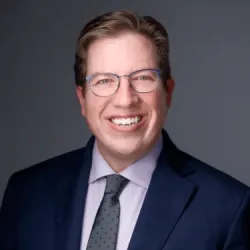When the president of Auburn Theological Seminary, the Rev. Dr. Emma Jordan-Simpson, imagines a world that’s healing, she hears the sound of children laughing.

“I say that because as a parent, a pastor, an organization leader and a member of the community, I know that when children are laughing, something’s going right,” she told the Rev. Bill Davis during a recent edition of “Leading Theologically,” which can be heard here.
“When you are pursuing the sound of children laughing, it changes the way you are engaging the world,” Jordan-Simpson said. When she heard her oldest child laugh for the first time, “it changed the way I engaged the world, because that’s the sound I want to hear, and I want to do everything to elevate that sound.”
During recent editions of the podcast, Davis, the senior director for Theological Education Funds Development at the Presbyterian Foundation, has engaged in conversations on repair, reconciliation and reparations with a number of faith leaders.
“One of the most powerful aspects of the difference that Jesus made was the vision that we could be reconciled with each other and with God, with humanity and with nature — that it was actually possible for us to do that,” Jordan-Simpson told Davis. As a pastor who has worked with leaders in other faith traditions, it “has been affirmed for me that spirit of reconciliation, that belief in reconciliation, is common to us,” she said. “We may use different words, but the basic tenets of forgiveness, the ability to address resentment and offer pardon, the atonement, making amends for wrongdoing and damage — the work of seeking peace — is indeed work. … Peacemaking doesn’t just happen. It needs to be pursued, and it has to be lived every day.”

“Even after great harms, it is possible for us to be healed,” she said, “and to remember and learn from the past so that we can work together to create a different future. That is the work of it all — the work of remembering, of telling ourselves the truth about history, about our past, learning from that not just so we have that as objective information, but because it forms the world we are called to build together.”
She called that approach to reconciliation “common in faith traditions. It’s not unique to Christianity. Sometimes people are put off by the word ‘reconciliation,’ particularly when your experience has been that you live among those who don’t want to reconcile or who demand reconciliation without accountability.”
Davis asked: What are those early steps in accountability?
“The peace that we settle for is the peace that’s about quiet,” Jordan-Simpson responded. “It’s about silence and about not acknowledging. It’s about keeping a stiff upper lip and going on. That’s a very fragile peace, because we’re human beings and we’re complex.”
Rather than a linear process, reconciliation is “a way of life,” she said. “It’s the complexity of our lives that has us at any moment seeking peace or reckoning with our past,” which is true “for people who have been historic harmers and those who have been historically harmed.”
Reconciliation “is not for the faint of heart,” she said. The first step, a step Auburn Seminary has taken, is to “invest in people’s ability to imagine — to imagine a world where we are reconciled.” At the memorial service for longtime Auburn Seminary President Barbara Wheeler, mourners heard a sermon from Zechariah 8:4–6, the prophetic vision of old men and women with staffs in their hands, sitting along the streets of Jerusalem while boys and girls play in those same streets. The vision ends with these words from the Lord of hosts: “Even though it seems impossible to the remnant of this people in these days, should it also seem impossible to me?”
“I think that’s the imagination for a reconciled world,” she told Davis, but “how do we help people to imagine that when we have conditioned people to believe that’s really not possible? It is possible.”
Mike Ferguson, Editor, Presbyterian News Service (Click here to read original PNS Story)
Let us join in prayer for:
Kate Trigger Duffert, Director for General Assembly Planning, Interim Unified Agency
Becky Trinkle, Project Manager, Administration, Communications Ministry, Interim Unified Agency
Let us pray:
Good and gracious God, we rejoice that you have called us to be your own and serve your church. We give thanks that by your Holy Spirit you give us what we need to fulfill your call upon our lives. Inspire us to use what you have given that we might grow in your knowledge and bear the fruit of our faith in Christ’s name. Amen.


No comments:
Post a Comment